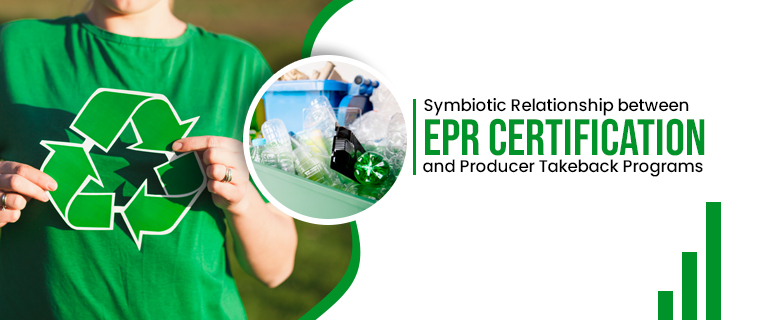A Catalyst for Sustainable Business Practices - EPR Certification
In the contemporary landscape of global sustainable development, businesses have emerged as key players in steering the trajectory towards a greener and more environmentally conscious future. Amidst the myriad strategies employed to mitigate ecological impact, one particularly impactful initiative has gained considerable traction in recent years—the Extended Producer Responsibility (EPR) certification. This certification not only underscores a commitment to environmental goals but also functions as a powerful catalyst for fostering sustainable business practices.
Extended Producer Responsibility, as a concept, places the onus on manufacturers to manage the entire life cycle of their products, from production to disposal. The rationale behind EPR is rooted in the belief that those who create products should bear the responsibility for the environmental repercussions of those products. By obtaining EPR certification, businesses signal their dedication to minimizing the ecological footprint associated with their operations. Moreover, Online EPR certification enhances a company's reputation by showcasing its commitment to environmental stewardship. Consumers, increasingly environmentally conscious, are inclined to support businesses that actively contribute to the global sustainability agenda. As a result, EPR certification not only aligns with regulatory requirements but also establishes a competitive edge for businesses in the evolving marketplace.
Understanding EPR Certification:
Extended Producer Responsibility is a concept that places the onus on manufacturers, importers, and distributors to manage the end-of-life disposal of their products. EPR certification signifies a commitment to responsible product lifecycle management, ensuring that businesses take responsibility for the environmental impact of their goods beyond the point of sale.
Read Also This – Communicating EPR Registration Efforts to ConsumersOne of the primary advantages of EPR certification is its ability to promote a circular economy. Businesses embracing this approach prioritize resource efficiency, waste reduction, and the reutilization of materials. This not only conserves valuable resources but also mitigates the environmental impact of production and consumption. Consequently, EPR-certified businesses often find themselves at the forefront of sustainable innovation, continuously seeking ways to optimize their processes and minimize negative environmental externalities.
EPR certification encourages businesses to adopt a circular economy model, wherein products are designed to be reused, refurbished, remanufactured, and recycled. This shift minimizes waste, reduces resource consumption, and promotes a more sustainable approach to production and consumption.
Certified businesses actively work towards minimizing their environmental footprint. This includes implementing eco-friendly packaging, optimizing energy consumption, and adopting innovative technologies that contribute to a lower carbon footprint. By embracing these practices, companies not only benefit the environment but also enhance their reputation among environmentally conscious consumers.
EPR certification aligns with the principles of Corporate Social Responsibility. Companies with EPR certification demonstrate a commitment to ethical business practices, contributing to social and environmental well-being. This, in turn, enhances brand image and customer trust.
As governments worldwide tighten regulations around environmental stewardship, EPR certification ensures that businesses stay ahead of compliance requirements. By proactively managing their environmental impact, companies mitigate the risk of legal repercussions and associated financial liabilities.
Stimulating Innovation:
EPR-certified businesses are incentivized to innovate in product design, manufacturing processes, and waste management strategies. This drive for innovation not only benefits the environment but also positions these companies as industry leaders, attracting forward-thinking consumers and investors.
Global Collaboration and Partnerships:
EPR certification fosters collaboration between businesses, governments, and non-governmental organizations. This collaborative approach facilitates the exchange of best practices, knowledge, and resources, creating a global network committed to sustainable development.
Read Also This – How EPR Registration gives rise to Circular Economy PracticesConclusion:
EPR certification serves as a powerful tool in promoting sustainable business practices. By embracing responsibility for their products throughout their lifecycle, businesses contribute to the broader goals of environmental conservation and resource efficiency. As consumers increasingly prioritize eco-conscious choices, EPR certification not only aligns with market trends but also positions businesses as champions of sustainability in the corporate landscape. In the journey towards a more sustainable future, EPR certification emerges as a beacon guiding businesses towards responsible and environmentally friendly practices.
In conclusion, the global pursuit of sustainable development relies significantly on the proactive engagement of businesses. Extended Producer Responsibility certification stands out as a potent instrument in this pursuit, fostering sustainable practices, driving innovation, and reinforcing corporate responsibility on a global scale. As more businesses recognize the intrinsic value of EPR, the collective impact on shaping a greener future becomes increasingly profound.




Comments
Post a Comment